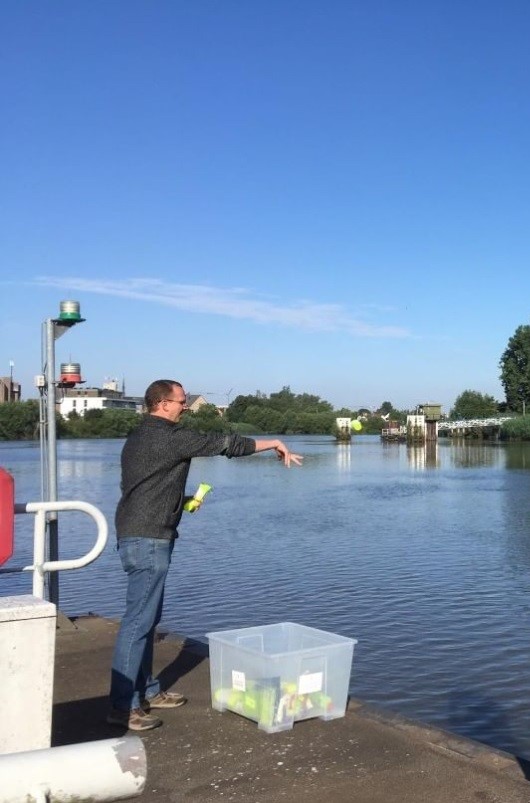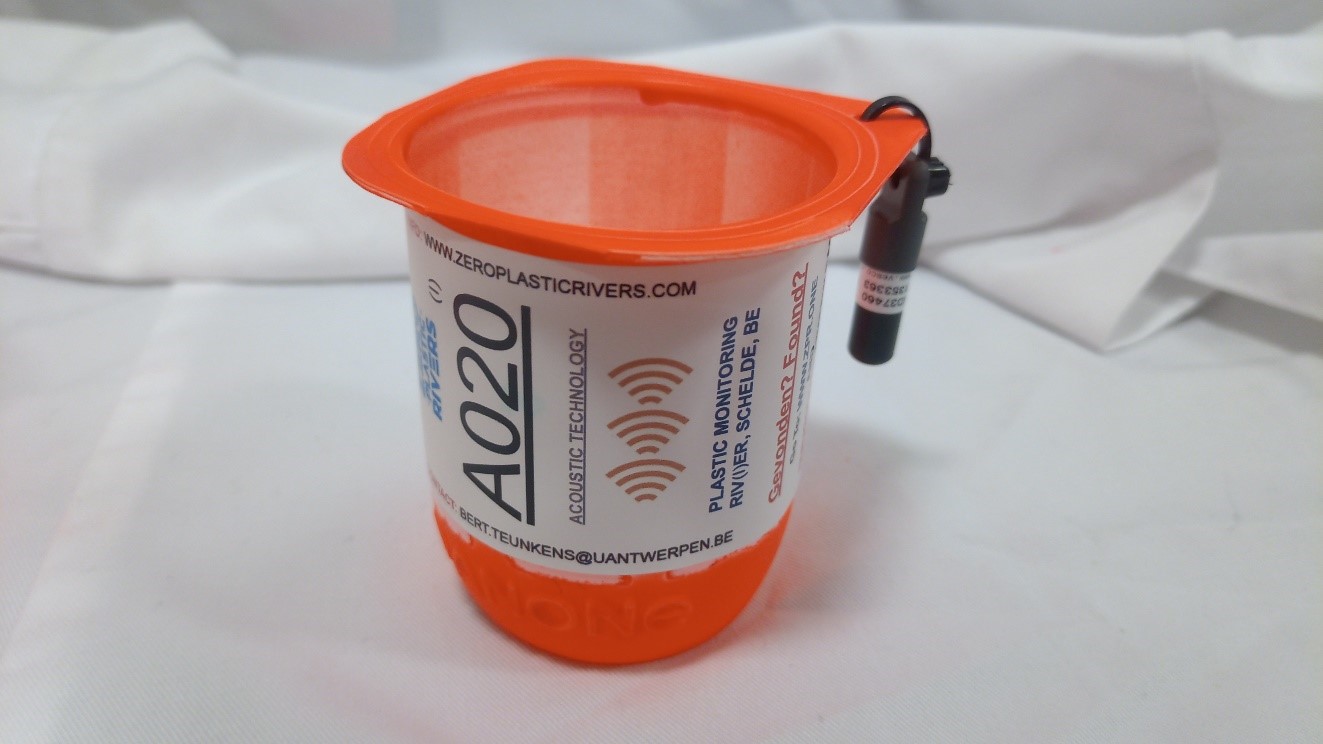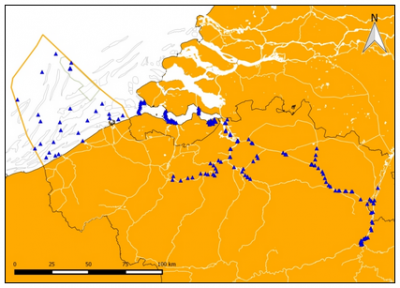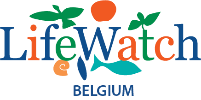You are here
Tracking plastics using fish tags
Acoustic telemetry proves to be a valid method to follow up the pathway of marked ‘daily use’ plastic items in rivers, in a more detailed manner than ever before. The idea of using acoustic telemetry to track plastic items came to mind, during a fish monitoring campaign organized by the Research Institute Nature and Forest (INBO, Belgium). It provides an answer to the problem that litter in rivers, once submerged, is difficult to trace with GPS technology. With the help of fish tags and the Lifewatch Fish acoustic receiver network, this proved to be possible. In the PLASTIBE project, acoustic telemetry is now being applied as a third technique, alongside the use of GPS trackers and the engagement of citizen scientists. This study is part of a larger research project, conducted by the University of Antwerp, to study the scale of macroplastic pollution in the Scheldt river and its contribution to plastic pollution in the North Sea.
Keywords: Plastic Pollution, Macroplastics, Scheldt River, Trash Interceptors, Acoustic Telemetry.

“While they were tagging Twait Shad (Alosa Fallax) and showing how they use acoustic telemetry to track a variety of fish species, I had an Aha experience: this system can be used to track plastic items in a detailed manner!”
Bert Teunkens
Bert Teunkens is a PhD Researcher at the University of Antwerp. In 2018 he started studying macroplastic pollution in the Scheldt river. His research targets current knowledge gaps in macroplastic pollution in rivers. Over time his research results should form the scientific basis to develop, new-generation, highly efficient trash interceptors to remove macroplastic in rivers before it reaches seas and oceans. Thanks to the Brilliant Marine Research Idea grant 2020 from VLIZ, which was sponsored by DEME, he was able to purchase a relevant number of acoustic tags. This allowed him to incorporate acoustic telemetry as a third technique in his study to follow marked items on their journey through the estuary of the river Scheldt.
Objectives
Plastic waste in coastal areas and the expanding “Plastic Soup” in our ocean are a growing threat for the marine environment. In recent years the role of rivers as a main contributor to marine plastic pollution has been repeatedly suggested. Therefore, the Ecosystem Management Research Group (ECOBE) of the University of Antwerp is studying the potential contribution of the river Scheldt to the worldwide “Plastic Soup”. In this project the focus is on macroplastics (≥2.5cm). A key component is to understand how plastic items behave once they are in a river. Variables like polymer type, shape, capacity to retain air, vegetation on riverbanks, reduced flow near the riverbed and wind direction all have an effect on the behaviour of plastics in a river. Therefore a ‘Track and Trace’ project was started to follow marked plastic items on their journey through the estuary of the Scheldt river. Initially, two techniques were used: GPS trackers built into a special container, and tracking a variety of plastic items through a Citizen Science Project. The big downside of that project is that only beached items retrieved by volunteers are registered. By using the fish acoustic receiver network of the Belgian LifeWatch Observatory it was possible to add a third technique and track plastic items in a more detailed manner than ever before. This is especially true for submerged ‘daily use’ plastic items moving in suspension or as bed-load, for which GPS technology is not suitable or which are less likely to be found on shores.


Methodology
Based on the results of a prior release using GPS trackers and inspired by the Citizen Science Project, 15 different types of plastic items were selected. These items have been duplicated to also study variability between identical items. Hence, a total of 30 plastic items were equipped with acoustic tags and released in the Scheldt river. In order to make them recognizable if found on a riverbank, the items were painted bright orange and equipped with a label carrying a unique number. If they are found they can also be registered through the website www.zpr.one, as would it be a bright yellow item which is part of our Citizen Science Project. The release took place in the most upstream part of the Zeeschelde (near Gent).
The VEMCO acoustic tags (V7-4x) used in this project are equipped with a special end-cap. Attached to the plastic item using UV-resistant tie-wraps. The batteries last about 347 days. All items were carefully selected and tested in advance, to make sure the weight of the tag would not interfere with the floatability of the selected plastic items.
These acoustic data require sophisticated analysis to unravel the extensive information they contain. Analysing these spatiotemporal patterns includes investigating how receiver locations are interlinked, at what conditions the detection patterns occur and how fish movements and distribution are influenced by environmental factors. The enormous numbers of detections, the high autocorrelation and zero-inflation call for advanced modelling approaches, such as network analysis and generalized linear mixed modelling, and a performant big data analysis environment.
Used components of the LifeWatch Infrastructure
Sensor network
Covering riverine, estuarine and coastal areas in Belgium, the BPNS and Scheldt Estuary, the permanent fish acoustic receiver network of the Belgian LifeWatch Observatory, allows the long-term monitoring of various aquatic species. Acoustic receivers are installed on shipping buoys, ship wrecks, artificial reefs and bottom moorings. Different Vemco receiver and tag types are deployed to monitor different species in varying habitats.

Output
Awards
‘Brilliant Marine Research Idea’ grant 2020 (VLIZ), sponsored by DEME.
News items
www.vrt.be/vrtnws/nl/2020/07/07/wetenschappers-gooien-opnieuw-plastic-in-de-schelde/
www.atv.be/nieuws/zoek-ook-jij-mee-naar-fluo-plastic-voorwerpen-in-de-schelde
www.uantwerpen.be/nl/onderzoeksgroep/ecobe/nieuws-en-evenementen/fluo-op-de-schelde/
www.uantwerpen.be/en/research-groups/ecobe/news-and-events/news/yellow-items-in-the-scheldt/
Contact
E-mail: Bert.Teunkens@uantwerpen.be
Tel.: +32 3 265 91 01
Useful links
- Quantification and characterization of the (macro)plastic flux in the Scheldt basin (Belgium)
- Brilliant Marine Research Idea Grant
- Zero Plastic Rivers
- Fish acoustic receiver network: Learn about the fish telemetry network of the Belgian LifeWatch Observatory.
- Data explorer: Access and explore the acoustic fish detection data with the LifeWatch data explorer.
